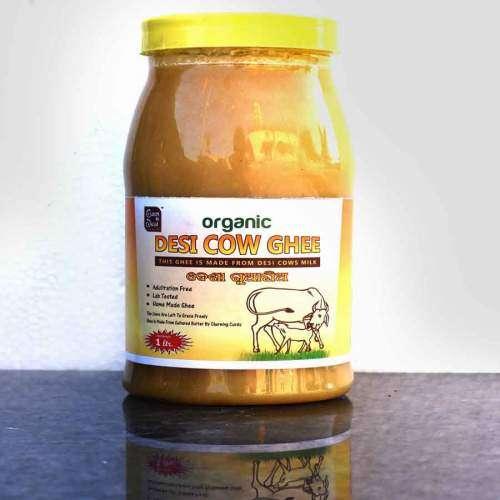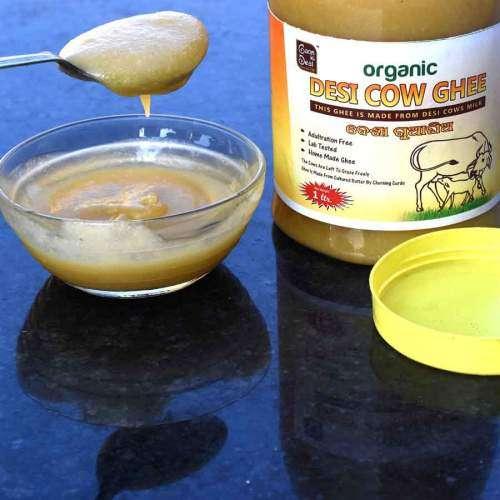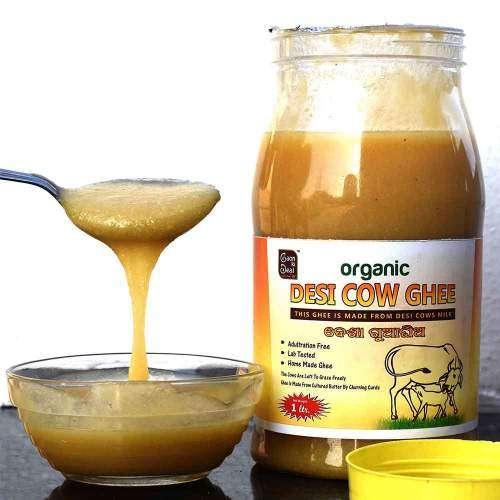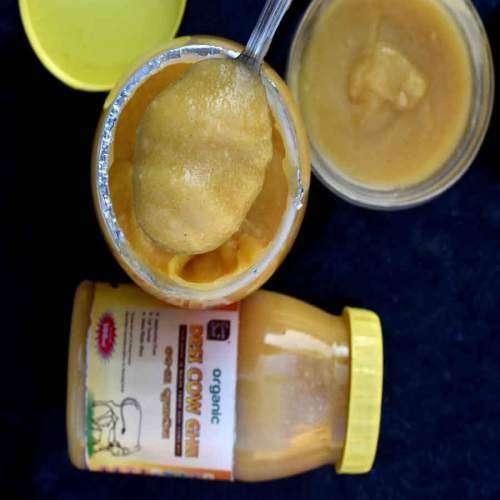Organic Desi Cow Ghee 1Ltr
₹1,800.0
The production of Organic Desi Cow Ghee involves a meticulous process that begins with sourcing milk from organically raised desi cows. These cows are allowed to graze on natural pastures and consume a diverse range of grasses, herbs, and shrubs, which contribute to the flavor and quality of the ghee.
To make Desi Cow Ghee, the milk is first boiled and then allowed to cool, allowing the cream to rise to the surface. The cream is then separated and churned to obtain butter. This butter is further heated gently until the moisture evaporates and the milk solids separate, leaving behind a golden, clarified liquid known as ghee. The ghee is then filtered to remove any impurities or remaining solids.
Organic Desi Cow Ghee is highly regarded in traditional Indian Ayurvedic practices for its numerous health benefits. It is rich in essential fatty acids, vitamins, and minerals. The ghee contains butyric acid, which is believed to have anti-inflammatory and digestive properties. It is also considered a good source of fat-soluble vitamins like vitamin A, D, E, and K.
The flavor and aroma of Organic Desi Cow Ghee are distinct and highly prized. It has a nutty, caramel-like fragrance and imparts a rich, buttery taste to food. Due to its high smoke point, ghee is suitable for cooking at high temperatures, making it a versatile cooking fat for various culinary applications.
Additionally, Organic Desi Cow Ghee is often revered for its cultural significance in Indian cuisine and rituals. It is used in religious ceremonies, as an offering, and is believed to have auspicious properties.
When choosing Organic Desi Cow Ghee, it is important to look for reputable brands that adhere to organic farming practices and prioritize the welfare of the cows. Organic certification ensures that the ghee is produced without the use of synthetic pesticides, antibiotics, or hormones, and that the cows are raised in a natural and humane environment.
Overall, Organic Desi Cow Ghee is a cherished ingredient in Indian households, valued for its health benefits, unique flavor, and cultural significance.
- Description
- Additional information
- Reviews (0)
- Q & A
- Sustainability Remark
- More Offers
- Store Policies
- Inquiries
| Weight | 1 LITRE |
|---|
You must be logged in to post a review.
Q & A
Organic desi ghee, also known as clarified butter, is a traditional ingredient used in many cuisines. When it comes to assessing the sustainability of organic desi ghee, several factors need to be considered:
Organic Production: Organic desi ghee is made from milk sourced from organically raised cows. Organic farming practices promote environmental sustainability by avoiding the use of synthetic fertilizers, pesticides, and antibiotics. It encourages biodiversity, soil health, and reduces the overall impact on the ecosystem.
Animal Welfare: The sustainability of organic desi ghee also depends on the welfare of the cows involved in its production. Organic farming typically ensures better living conditions for the animals, including access to pasture, reduced stress, and avoidance of growth hormones or unnecessary medication.
Energy and Water Consumption: The production of organic desi ghee involves several processes such as milking, churning, and clarification. While traditional methods may require less energy, modern production techniques might involve machinery and heating elements, which could impact energy consumption. Similarly, water usage during the process can also influence the overall sustainability.
Packaging and Transportation: The packaging and transportation of organic desi ghee can affect its sustainability. If the packaging materials are recyclable or made from sustainable sources, and if the transportation methods prioritize efficiency and minimize emissions, it contributes positively to sustainability.
Local and Fair Trade: Choosing organic desi ghee that is sourced locally and supports fair trade practices can enhance sustainability. It reduces the carbon footprint associated with long-distance transportation and ensures that farmers receive fair compensation for their products.
To determine the specific sustainability credentials of a particular brand or product of organic desi ghee, it's essential to look for certifications such as USDA Organic, EU Organic, or other recognized organic standards. These certifications verify that the product meets specific sustainability criteria.
Overall, organic desi ghee has the potential to be a sustainable option, especially when produced using environmentally friendly practices, prioritizing animal welfare, and considering the energy and water consumption throughout the production process. However, it's important to consider the specific practices of the producer or brand to make a more informed assessment.
General Inquiries
There are no inquiries yet.






Reviews
There are no reviews yet.